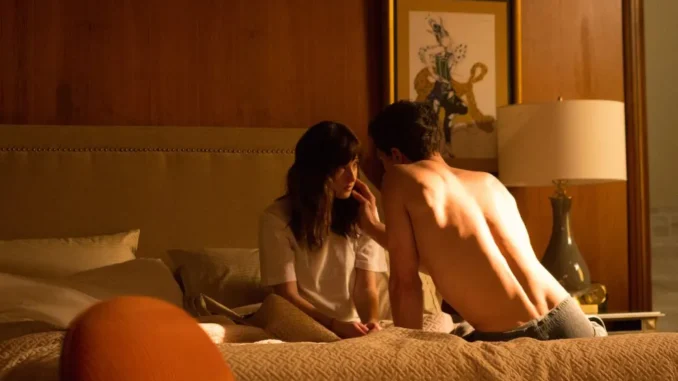
Fifty Shades of Grey is brilliantly hilarious. But it’s not clear if this was intentional
Alex Abad-Santos is a senior correspondent who explains what society obsesses over, from Marvel and movies to fitness and skin care. He came to Vox in 2014. Prior to that, he worked at the Atlantic.
Fifty Shades of Grey might be the greatest bait and switch ever perpetrated on Americans.
:no_upscale()/cdn.vox-cdn.com/uploads/chorus_asset/file/3409872/MV5BMTgxMDYyMjkzNF5BMl5BanBnXkFtZTgwNjM3MjI0NDE_._V1__SX1394_SY702_.0.jpg)
Since 2011, when the first book in E. L. James’s trilogy was released, we have heard endlessly about how readers (primarily women) were consuming James’s novels, even though they were written in a style that might be called “word salad with lite-BDSM dressing.” The words were meant to make you blush — and keep reading chapter after chapter, like a competitive eater reaching for the next set of chicken wings.
Rating
It comes as a surprise, then, that the filmmakers went in a completely opposite direction. The first Fifty Shades movie is a surprisingly hilarious piece of cinema that’s equal parts sci-fi and romantic comedy.
What began as a tale of a young woman falling in love with an older gentleman with kinky tastes has morphed and twisted in the hands of director Sam Taylor-Johnson into a story that involves a young, weather-manipulating woman who falls in love with a teleporting incubus whose greatest weakness is the banal pleasure of contract law.
Dakota Johnson is a comic genius
Our heroine, Anastasia Steele, is played by Dakota Johnson as mumbly and mousy. Physically, we’re meant to see this weather witch is awkward because she sports a set of unbecoming bangs and has a penchant for dressing in a fashion that seems to be openly combative to the occasion. On the night she’s supposed to “go out,” for instance, she wears a T-shirt.
But she also, apparently, has superpowers. Throughout the film, the weather reflects Ana’s mood. When she cries, the storms pour. When she’s happy, the Seattle clouds separate and golden hues drape the city. And when she’s sexually aroused, the sky blesses her with a gentle drizzle.
It’s unclear whether Steele is aware of her weather-manipulating properties in the same way it is unclear to what degree Johnson is willfully satirizing and subverting the story. One thing’s clear, though: her deadpan delivery of lines like “Are you going to make love to me now?” or “What is a butt plug?” is hilarious.
In the books’ nascent stages, they were Twilight fan fiction. Ana was originally that series’ terminally bland protagonist, Bella. But Johnson gives Ana gory bits of humanity in a deeply funny, amusingly awkward performance that recalls, of all people, Michael Cera in Superbad.
Jamie Dornan is very serious
Johnson’s comedy is further enhanced by her paramour. Jamie Dornan plays the strange billionaire/creature known as Christian Grey. The two actors often feel like they’re stuck in different films. Dornan spends much of the movie furiously knitting his brow and glaring with his cold eyes, while Johnson comically fluffs up the pensive scenes Dornan tries to ground.
Though Christian has an extended family, and though he is seen driving cars and doing things normal humans do, it all just appears to be an elaborate cover, as he is really a glamorous, shadowy specter who exists beyond our comprehension. There are multiple scenes in which Grey manifests himself out of nowhere. He is not seen or heard entering houses, hardware stores, and hotels through conventional means like doors. It’s not readily clear that Christian even knows what a door is.
Christian offers telltale signs that he typically lives in shadows. For starters, he rides shotgun with his manservant Taylor. Everyone knows you sit in the back when being driven by your manservant.
Further, Christian doesn’t seem to eat a full meal in the film, though there are two semi-important dining scenes, and there is one scene where he is able to communicate with Ana while she sleeps, just by talking out loud in the same room. Grey also has the ability to text and drive at the same time without causing accidents on human roadways.
Christian having a paranormal nature would also explain why he has “singular” tastes. He seems bound to our world by a magic document called “the contract.” Like the sea witch in The Little Mermaid, his document needs Ana’s signature, and until it’s signed it binds Grey, forbidding him to inflict harm upon others in pursuit of pleasure for himself. The enduring power of this document is what the movie wraps itself around. There is so much negotiation.
All jokes aside, this alien quality is what makes Dornan so effective as Christian. Humanity seems foreign to Dornan’s Christian, which makes sense for a character who could be completely empty.
Caught in a bad romance
There are other signs Steele and Grey are living in a dystopian future. Google does not exist. Ana uses a flip phone, and at one point, she’s given a new computer but not a new phone, perhaps signaling that smartphones have gone extinct. Street parking is relatively easy to find, a possible sign that cars have gone extinct, too. Grey mentions “African charity work,” possibly alerting us to the idea that Africa is one giant super-country now.
Were these touches intentional? It’s impossible to know. We do know that Taylor-Johnson and James didn’t get along. Perhaps Taylor-Johnson has created one of the most elaborate, slow-baked revenge plots of history by injecting comedy and weird, almost sci-fi touches into what was meant to be a filmic adaptation of a too-self-serious pulp novel.
And if those touches were intentional, it makes the film all the better, a surprising success. Seen through the lens of a sci-fi romantic comedy about a man who’s barely human and the awkward woman who comes to love him, Fifty Shades is a masterpiece of subversion and dark humor — and much, much better than anything our kinky minds could have imagined.